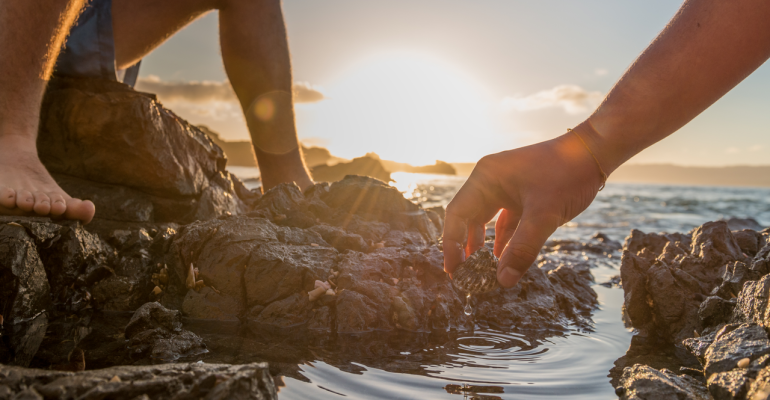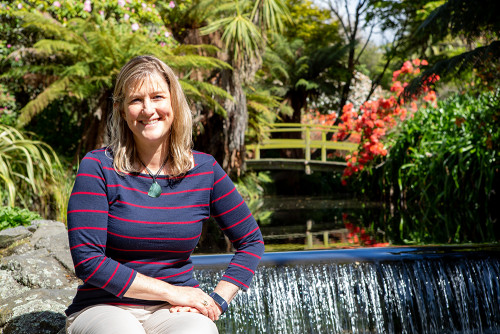Ko te wai ko te ora - tackling fresh water pollution
16 November 2020 | Read time: 7 minutes

A team of multi-disciplinary researchers, in partnership with Māori, iwi, councils and industry are developing new technology for treating wastewater, with a mission to improve freshwater quality and restore the health of our awa (rivers) and streams.
Research tackling the big issues facing Aotearoa is critical to the work of the Science for Technological Innovation National Science Challenge. This new three year, $3 million Spearhead project known as ‘Clean Water Technology for restoring Te Mana o te Wai’ is led by University of Canterbury Associate Professor in Ecological Engineering, Dr Aisling O’Sullivan.
With new rules and regulations introduced in September 2020 as part of the Government’s Essential Freshwater package of reforms, water treatment plants will be required to bring their facilities up to standard to meet the more stringent water discharge guidelines.
“Currently around 60 percent of municipal water treatment facilities that discharge to inland waterways would not meet the new regulations,” says O’Sullivan.
“Our aim is to better enable them and other industries to tackle water pollution issues in a more reliable and sustainable way.”

Ko te wai te ora o ngā mea katoa, water is the life-giver of all things
Rivers and lakes are integral to Māori cultural identity. Their health and wellbeing is intrinsically connected to the health and wellbeing of whānau, iwi and hapū. As the Whanganui pēpeha recites – Ko au te awa, ko te awa ko au, I am the river and the river is me.
Whanganui iwi leader Ken Mair, who supported and helped create the values and principles for project development discussions with Māori, says:
“It is extremely important to have values to leverage from to ensure that the right of the water is upheld and the first right goes to water in any [research] project. I think there is an in-depth understanding that water is life and that Māori, iwi, hapū values underpin that.”
O’Sullivan adds: “We will be guided by our Māori partners, iwi advisors and SfTI leaders, and are very fortunate to be able to work with Māori research partners and advisors who have extensive skills and experience in working in this area such as Craig Pauling (Ngāi Tahu, Kāti Mamoe, Waitaha and Ngāti Mutunga) and Troy Brockbank (Te Rarawa, Ngāti Hine, Ngāpuhi), who is an urban stormwater engineer/Kaitohutohu Matua Taiao and on the board of Water New Zealand. We also aim to work with our Kaiārahi Māori Corban Te Aika from Ngāi Tūāhuriri in connecting us with Canterbury iwi on this research.
“And we plan to use the steps of the He Poutama Whakamana cultural engagement approach to demonstrate how mātaraunga Māori can inspire, inform and improve technical developments and product design.”
An Advisory Group will oversee the project to bring together the necessary range of perspectives and expertise. This group has consultancy expertise across: iwi engagement for environmental management and policy, local/regional and central government consultancy and technology commercialisation.
Technology to create a sustainable water pollution solution
The research team, drawn from seven national institutions and one international collaborator, will prototype new, biodegradable filtering media - the materials that are used to extract pollutants such as heavy metals from stormwater runoff in urban areas as well as nutrients like nitrates and phosphates that make their way from farms into rivers and streams and which can damage freshwater ecosystems.
“We wanted to create the biggest impact possible. That’s why we’re focused on pushing current science boundaries relating to innovative media that can be applied to many treatment technologies rather than developing just one such technology or a solution for just one sector,” says O'Sullivan.
Key to the project will be experimentation with new biofabrication techniques, such as 3D printing and/ additive manufacturing, allowing the researchers to create water treatment media to the precise specifications for the types of pollutants they are seeking to remove.
Wastewater treatment plants currently rely on modified materials such as activated carbon or plastic biofilm carriers (for growing microorganisms, i.e. bacteria) to treat wastewater. But their efficiency is variable and many of the filters end up in landfill at the end of their lifespan. At the same time, technologies to treat other wastewaters, such as stormwater, are currently limited by their filter materials.
Biofabricating new treatment materials will help overcome the current limitations of water treatment filters. The use of biodegradable materials could also improve the economics and sustainability of water treatment at a time when billions need to be spent around the country to upgrade wastewater treatment facilities.
Sustainable water technology
The project will see biofabricated wastewater treatment media developed as a ‘proof of concept’ in the lab with field trials to follow in the third and final year.
O’Sullivan says: “Our research team’s combined expertise in 3D printing technology, materials science, mātauranga Māori, environmental chemistry and biotechnology, will enable us to push the limits of biofabrication capabilities in the manufacturing of more efficient engineered materials designed for a wide range of water treatment applications. So, the research outcomes will establish a platform for new water treatment technologies that are precisely fit-for-purpose and sustainable, and that address some of the most pressing needs of the water industry not only in Aotearoa New Zealand but internationally.”
The Spearhead Project will commence in February 2021.
Six PhD scholarships available - apply now to join the team!
Calling on students to join the team’s mission of returning Te Mana o te Wai to our ecosystems and tangata whenua. With six PhD scholarships being made available, the Spearhead project is an unprecedented opportunity for rangatahi research students to get involved in an area of particular interest to iwi and their communities.
Background to the project development
In December 2019, we called for expressions of capability from researchers to support the design of a new Spearhead project arising from the Clean Water Technology (CWT) Mission Lab. Successful applicants joined the Clean Water Technology researchers workshop on March 10, 2020. The focus of the workshop was to discuss next steps, and develop project ideas that could become part of a single, integrated research programme. Learn more about the workshop.